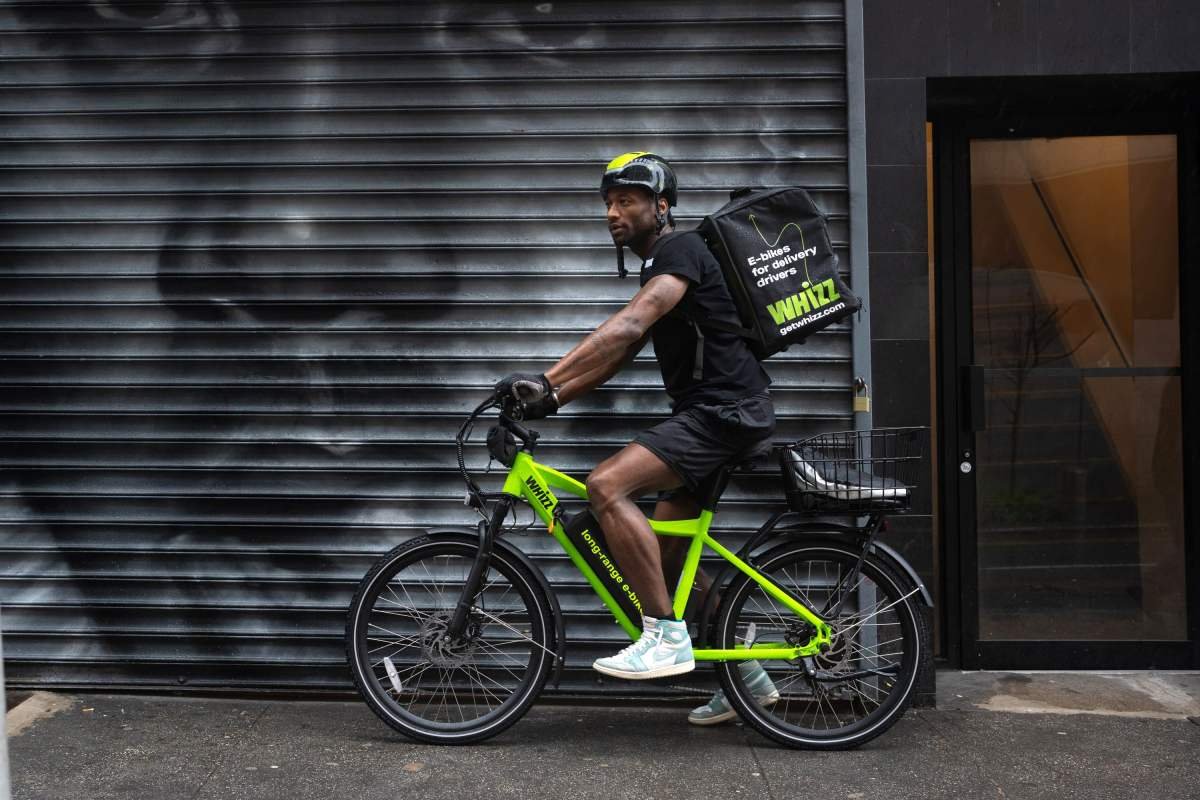New York City, home to over 60,000 gig delivery workers, has been cracking down on cheap, uncertified e-bikes that have resulted in battery fires across the city.
Some e-bike providers may see such regulations as a problem for business. But e-bike subscription startup Whizz sees it as an opportunity.
“I think the market is moving from a Wild West to a mature market,” Mike Peregudov, CEO and co-founder at Whizz, told TechCrunch. “We’re lucky to be here in this moment because after all the regulations happen, it will be very hard to enter this market.”
The New York-based startup claims to offer gig workers access to safe, high-quality e-bikes for between $139 and $149 per month. Couriers for Grubhub and DoorDash, Whizz’s official partners in NYC, can access subscriptions and rent-to-own schemes for 15% off. Subscriptions include service, maintenance, anti-theft protection and more.
Founded in 2022, Whizz this week raised $12 million to build more e-bikes, begin producing e-mopeds and expand beyond New York to other cities, including Boston, Chicago, Miami, Philadelphia and Washington, D.C. The round was broken into $5 million in equity led by Leta Capital and $7 million in debt from Flashpoint VC.
Ultimately, Whizz wants to launch nationwide. In the short-term, the startup aims to manage 40,000 e-bikes in the NYC area over the next three years, up from the 2,500 e-bikes Whizz currently has deployed across NYC and Jersey City.
There are few players in the e-bike subscription space in the U.S. Whizz’s main competitor is Zoomo, an Australian startup with a presence in NYC and a handful of European cities. Zoomo’s subscription costs, on average, are about $49 per week or just under $200 per month. Uber Eats couriers get a better deal at $24 per week, or just under $100 per month. Zoomo also works with enterprise customers to provide entire fleets.
The lack of disruption in the e-bike subscription arena could mean that Whizz is in a perfect position to get a first-mover advantage. Or it could mean that the e-bike subscription model is difficult to get right.
Other consumer-facing micromobility subscriptions in NYC have come and gone, like Beyond’s e-scooter rental offering and charging infrastructure company Revel’s attempt at an e-bike subscription. And as we’ve seen from the many failures of shared micromobility companies like Bird and Superpedestrian, hardware-as-a-service (HaaS) is a high-capital expenditure business. That doesn’t always square up to the most attractive aspect of subscriptions: an affordable price point. The combination of the two opposing forces often translates to unimpressive margins.
On the other hand, subscriptions have the benefit of repeat revenue, which can be leveraged to improve margins as long as a company keeps operations lean and efficient.
Whizz says this is where it can shine. The startup has relied on its proprietary software that streamlines operations and a culture of bootstrapping to grow 3.5x year-over-year and reach an annual recurring revenue (ARR) of more than $8 million as of May. ARR is a projection of revenue for the year based on current and expected customer numbers.
Peregudov also says Whizz will be EBITDA positive in two to three months and fully profitable within nine months.
The CEO and his co-founders all came to New York from Russia a few years ago after founding and selling subscription-based businesses. Peregudov built Partiya Edy, a meal-kit delivery service, and sold it to Yandex in 2019 for $25 million. His co-founders — Alex Mironov, Ksenia Proka, and Artem Serbovka — built and sold an e-bike subscription platform, Moy Device, to a private equity firm in Russia.
“We never raised hundreds of millions, and I think in this type of business, that could be dangerous,” Pergudov said. “We’ve seen companies that have raised $100 million and then they try to blitzscale. This business is not about blitzscaling.”
Using software to improve unit economics

Peregudov says the most important part of Whizz’s business is its proprietary “enterprise resource management” (ERP) system, the software that powers the back-end and protects Whizz’s assets. The CEO says this software helps Whizz cut costs by 35%, achieve a 85% fleet utilization rate and “improve margins at every step.”
The software provides analytics on everything from how much time it takes to complete a repair to how IoT can help manage warehouse logistics, from information on all bikes and customers in the system to revenue and payments management. Whizz’s system can even remotely control parts of the bikes to brick them if they get stolen.
Another aspect of Whizz’s software is its internal scoring model, which the startup uses to ensure it’s renting bikes to responsible people. “This scoring system is AI-enabled with more than 50 parameters, and it’s like a bank credit score,” Peregudov said. “These guys are mostly immigrants, and we are probably the only company on the market that can score them because banks don’t do that. That’s why these guys don’t have credit scores. Our bikes are often the only option for affordable transportation for them.”
Quality e-bikes, batteries and service

Whizz’s e-bikes are also designed in-house specifically to service food delivery workers. Peregudov claims the bikes are reliable enough to ride for up to 1,000 miles per month and have large batteries to enable couriers to drive more, and thus, earn more. The batteries, he says, are UL certified and built with Samsung cells.
Gig workers in NYC can visit one of Whizz’s five hubs to pick up bikes and have them repaired or replaced in 30 minutes or less. The hubs are located in Midtown, Union Square, Harlem and Brooklyn, with a fifth coming this week to Jersey City.
Whizz also says it offers customer service in six languages: English, Spanish, French, Turkish, Arabic and Russian.
The major snag in Whizz’s future plans is the fact that its bikes and batteries are all assembled in China. The Biden administration recently announced new tariffs on Chinese imports, including e-bikes and batteries, which will be subject to a 25% price hike. Peregudov says he’s not worried because Whizz owns its IP and can move production to a new partner in India or Vietnam.
Can Whizz’s model scale across the U.S.?
While the e-bike subscription market geared at gig delivery workers is still new, it’s not a guarantee that Whizz will be able to scale in the U.S.. Zoomo, the incumbent, as it were, has a respectable presence in Europe, but its market share in the U.S. has recently shrunk. The startup used to offer its services in San Francisco, but shuttered there in 2022. Zoomo did not respond to TechCrunch to explain what went wrong.
Whizz’s strategy for expansion is twofold: Work its way down the East Coast before expanding nationally; and offer new form factors to reach a broader range of delivery workers.
Whizz’s latest funding round will help get the company part of the way by taking more territory in NYC and building a new e-moped. In the long run, the startup sees itself even potentially bringing EVs onto the platform for delivery workers who don’t live in bike-friendly cities, which are few and far between in the U.S.
Sergey Toporov, a partner at Leta Capital who led Whizz’s equity round, said he invested in the startup because it was able to achieve a great contribution margin on a small scale.
Toporov noted that Leta mainly invests in software companies, so Whizz’s ERP system is what appealed the most because it will help the company stay efficient and organized as it scales its fleet, customers and employee base and brings on new types of vehicles.
“The hype around micromobility and fast delivery has passed, and most VCs have pivoted to other industries. However, we strive to focus on companies with fundamental business value in the markets not inflated by an excess of capital,” Toporov said. “We believe that Whizz is a hidden gem that will continue to surprise the market.”





